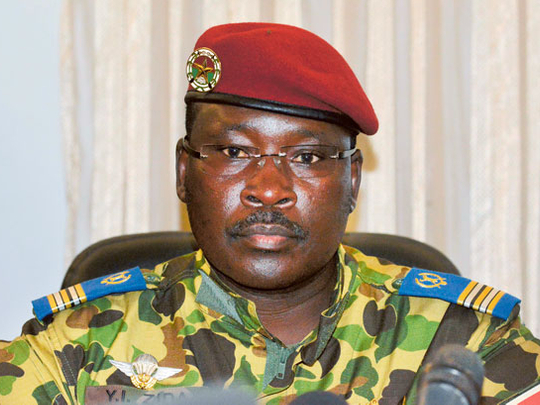
OUAGADOUGOU: A UN envoy called Sunday for a civilian transition in Burkina Faso after the ouster of president Blaise Compaore, threatening sanctions if the military holds on to power in the West African country.
“We hope there will be a transition led by a civilian and in keeping with the constitutional order,” the UN envoy for West Africa, Mohammad Ibn Chambas, told a news conference. “If not, the consequences are pretty clear. We want to avoid having to impose sanctions on Burkina Faso.”
The military named a high-ranking officer, Isaac Zida, to lead the country’s transition on Saturday. A day earlier, Compaore was forced to resign as plans to extend his 27-year rule exploded into violent demonstrations that saw parliament set ablaze and hundreds of thousands take to the streets.
Chambas was speaking on behalf of a tripartite group of mediators that included representatives of the African Union and the Economic Community of West African States, after they met with 49-year-old Zida and top military brass.
They “assured us that they had well understood the message,” Chambas said.
The former French colony prepared for another day of mass protest as opposition and civil society leaders challenged moves by the military to step into the power vacuum left by Compaore’s ouster.
The developments are being closely watched across a continent where several other veteran heads of state are also trying to cling to power.
Zida, who beat out a rival claim by the landlocked nation’s army chief to lead the transitional government, vowed to work closely with civil society.
Under the constitution, the speaker of parliament should serve as transitional leader.
Opposition and activist leaders swiftly issued a statement warning the military against a power grab, demanding instead a ‘democratic and civilian transition’.
“The victory born from this popular uprising belongs to the people, and the task of managing the transition falls by right to the people. In no case can it be confiscated by the army,” they said in a statement.
They called a new mass rally in the capital Ouagadougou on Sunday at the site now nicknamed ‘Revolution Square’.
Zida, the second in command of the presidential guard, said he had assumed “the responsibilities of head of the transition and of head of state” to ensure a “smooth democratic transition”.
The transition will be carried out “together with the other components of national life,” he said, referring to the political opposition and civil leaders.
The army’s endorsement was signed by General Nabere Honore Traore, who initially said he would himself assume power, a claim Zida had dismissed as ‘obsolete’.
“The aspirations for democratic change” of the Burkina youth “will be neither betrayed, nor disappointed”, Zida said.
Speaking on television early Saturday, the military officer also said the ousted president was “in a safe place” and his “safety and well-being are assured”.
In neighbouring Ivory Coast the presidency confirmed reports that Compaore, who left Ouagadougou on Friday, was in the country.
Ouagadougou residents were gearing up for fresh protests.
“We are completely against soldiers taking power,” Salif Ouedraogo, a 38-year-old insurance agent, told AFP on Saturday.
“We want a civilian as head of state and tomorrow we are going to regroup at Revolution Square to say no to military power. Even if it means that there would be bloodshed.”
Opposition figures have said around 30 people were killed in Thursday’s violence. AFP could confirm only four deaths.
The uprising was sparked by plans to change the constitution to allow Compaore to stand once again for elections next year.
France’s President Francois Hollande said Paris would “contribute to calming” the situation in Burkina Faso, while Washington urged “a transfer of power in accordance with the constitution”.
Compaore was only 36 when he seized power in a 1987 coup in which his former friend Thomas Sankara was ousted and assassinated.
His bid to hold on to power particularly angered young people in a country where 60 per cent of the population of almost 17 million is under 25.
Many have grown up under the leadership of one man and are disillusioned by the establishment that has led a country which is languishing at 181st out of 187 countries on the UN Human Development Index.
Known in colonial times as Upper Volta, the country won independence from France in 1960 and its name was changed to Burkina Faso (‘the land of upright men’) in 1984.












